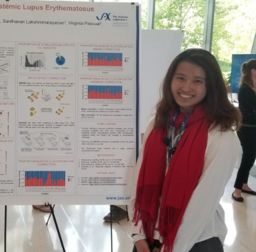
By Maggie Moore
Originally posted June 18, 2019. Reprinted with permission by The Jackson Laboratory.
When Isabelle Chen, a senior at The Ethel Walker School in Simsbury, Conn., met Ann Bresnahan ’69 during a science alumnae panel discussion at Bresnahan’s 50-year high school reunion, the two knew that they shared a passion for science. But they had no idea that they also shared a special connection with The Jackson Laboratory (JAX).
Bresnahan has been a supporter of the Laboratory for 25 years, while Chen, who will attend Northwestern University in the fall of 2019, just wrapped up a year-long internship at The Jackson Laboratory for Genomic Medicine. Suzanne Piela, D.V.M., Chen’s science teacher and chair of the science department at The Ethel Walker School, participated in the Laboratory’s Teaching the Genome Generation program, a unique professional development program for teachers to enhance genetics instruction in their high school classrooms.
“The relationship with JAX and Ethel Walker is a match made in heaven,” says Bresnahan. “I so enjoyed meeting Isabelle for the first time and reconnecting with Suzanne at my 50th reunion, and couldn’t be more proud of our mutual association.”
A labor of love
Each year, several outstanding high school and undergraduate students make the commitment to participate in a research experience at JAX while also being full-time students. JAX interns work part-time on independent research projects under the sponsorship of a member of the Laboratory’s faculty who provides guidance, laboratory space and equipment.
Chen learned how to use data analysis to study lupus, which is part of a family of autoimmune diseases, under the mentorship of JAX professor and immunologist Jacques Banchereau, Ph.D. She credits Piela with encouraging her to apply to the program.
Chen’s interest in science was sparked when her grandmother was diagnosed with leukemia four years ago. “I was studying biology at the time of her diagnosis, which is all about DNA and other molecules that you cannot see in normal life. It’s enthralling because I have always been a very imaginative kid,” she explains. “Then, I thought, maybe I can do something with this interest by setting it as my life goal to become a researcher and pursue something greater.”
Chen’s final project, entitled “scRNA-seq Analysis of Adult Systemic Lupus Erythematosus PBMCs and Its Challenges,” was a labor of love: she designed the project, implemented the research plan, analyzed data and reported results.
“I learned a lot this past year. Science takes a lot of initiative. Sometimes, I would do data analysis and get null results, and that was frustrating,” says Chen. “But my teachers at both JAX and Ethel Walker taught me about what being a scientist means. It means perseverance and the pursuit of your passion, no matter what.”
Teaching the Genome Generation
“Isabelle is an amazing student,” says Piela, who teaches Chen in advanced biology and honors biochemistry. “She is incredibly diligent and extremely bright. She will go above and beyond in the classroom, reading scientific articles that pertain to what we’re discussing in class, asking thought-provoking questions, always willing to learn more.”
“I’ve seen tremendous growth in Isabelle this year in terms of learning that it’s okay to fail in the laboratory — it’s all part of the process,” says Piela. “I think her experience at The Jackson Laboratory has taught her a lot about resilience and perseverance. This is a lesson that students don’t always learn in high school.”
Piela practiced as a small animal veterinarian for 10 years before transitioning to teaching. “Because of my medical background, I have a passion for genetics and medicine,” she says. “And I love the idea of precision medicine: using the genome in order to be able to treat and care for people. These interests brought me to The Jackson Laboratory.”
She says Teaching the Genome Generation transformed the classroom experience for students in her advanced biology class, a college-level biology course. “I can’t say enough about the program in terms of how it has enhanced my teaching. And the support we receive has been outstanding. I really appreciate all that I learned and all that I’m able to do each year because of it,” says Piela.
The program provides an adaptive curriculum in three areas: molecular genetics laboratory skills, bioinformatics and bioethics. Curricular support during the school year includes lesson plans and laboratory equipment for high school classrooms, which allowed Piela’s students to participate in an engaging two-week lab experience. “The students love immersing themselves in the lab. They really get it, they really understand it. They feel like scientists when they’re doing this work,” she says.
A bright future
“Suzanne is a top-notch educator and mentor to these bright young women,” says Bresnahan. “And I am so proud of Isabelle, who will continue her studies in science and clearly has a bright future in front of her. I am rejuvenated by the connections between two very important institutions in my life.”
Chen says that both Bresnahan and Piela have inspired her to pursue a career in science. “It’s important to have more women in the research field and doing science,” she says. “Our entire science department is women, all with advanced degrees in their specific scientific disciplines. I think this is awesome, because it’s important for girls here to be able to see themselves in us and see themselves as scientists,” adds Piela.
Bresnahan’s family has long supported science: the Ethel Walker science wing bears her mother’s name, as does a plaque at JAX’s Bar Harbor campus. “My family has supported the Laboratory through the years, and the intersection in this new generation is heartwarming,” says Bresnahan.
Chen calls her time at JAX “fascinating” and says she will always cherish her internship experience. “It solidified for me what I want to do in the future, which is to be a researcher in immunology,” she says. She plans to major in biomedical engineering at Northwestern University, and her goal is to pursue her Ph.D. in immunology.